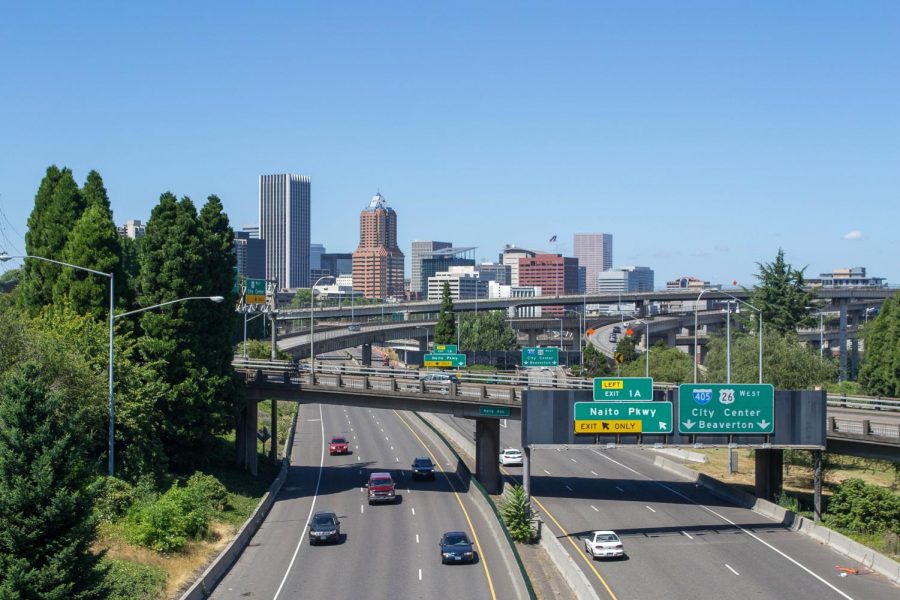Gentrification: What You Need to Know and What You Should Do
May 9, 2018
As a growing city, Portland has become a popular destination for both new residents and new businesses. Whether you see it in the increased traffic or the growing number of coffee shops, it is very clear that Portland is becoming a more desirable place to live in.
Although we see the changes in our own city, not all of us are aware of what causes these changes and who is affected by them. This phenomenon is called gentrification, the process of renovating urban neighborhoods to make them more suitable for affluent residents. In 2017, Portland was the 4th fastest gentrifying city in the country. And while most of us may enjoy the outcome of gentrification—such as new restaurants and safer neighborhoods—there has always been a side that loses in this economic progress, specifically African Americans and other minorities.
The alarming increase of gentrification in Portland is in desperate need of our attention because this economic progress comes at the risk of displacing thousands of people of color who call Portland their home.
Undeniably, gentrification has helped Portland economically, attracting tons of businesses and bringing in new jobs. The visual transformation that many Portland streets, such as Division, have gone through over the past decade is a testament to how much the city has grown. Just by walking through downtown, you can see that Portland always has ongoing construction projects, such as Mortenson Construction’s $220 million Convention Center hotel. This has created thousands of job opportunities for Portlanders, keeping the overall unemployment rate for Oregon at an impressive 4.1%.
However, the jobs that are being created and the neighborhoods being renovated are not serving many Portland natives. In fact, average white incomes grew from about $55,000 to $60,000 from 2000 to 2013; meanwhile, average black incomes fell from $35,000 to less than $30,000. A report published in 2017 by the Portland Housing Bureau revealed that there is not a single neighborhood in the city where an average Black or Latino household can purchase a home.
These statistics are not surprising when you look back at our state’s history of ignoring the minority and therefore creating a disadvantage for black communities. Portland’s reputation for modern progressiveness tends to overshadow our shameful history of racism that deteriorated communities of color and leaves its lasting effects today.
Dating back to the beginning, Oregon had a State Constitution in 1857 that banned African Americans from residing in Oregon. The rise of the Ku Klux Klan in Oregon made the state even more inhospitable for its black residents. Our history of racist inclusion has in turn impacted our city’s demographics, with only 6.3% of Portland’s current population identifying as African American, giving Portland the title of “the whitest city in America.”
Even when the tables seemed to be turning, in the 1970s, the city government supported Emanuel Hospital’s expansion in North Portland. The expansion caused hundreds of homes and businesses owned by people of color to be destroyed. Now, the U.S. Census Bureau found that 8,900 African Americans moved out of North and Northeast Portland from 2000 to 2014 because of gentrification alone, whether it was because of new businesses coming in or because of the thousands of middle class people moving into Portland. The steep increase in rent paired with Portland’s inability to support its already disadvantaged communities of color has caused this large disparity.
While gentrification is a vast issue, every day citizens can help mitigate the effects of gentrification by supporting minority-owned businesses. Even small actions, like eating at a family-owned restaurant rather than a chain restaurant, can make an impact. Choosing to support these businesses doesn’t cost much but still benefits the people of color in your neighborhoods.
But the most important thing you can do to help this cause is to act. Cornelius Swart, producer of the gentrification documentary “Priced Out,” says that regular people should “get engaged and remain engaged, because local governments have tried and proposed and promised solutions in the past, but without the public constantly breathing down the neck of public officials, the ball will be dropped.”
Whether you join the mission of local nonprofits, such as the Portland Community Reinvestment Initiatives, Inc., or contact your government representatives, your voice and actions are essential in making sure Portland truly becomes the progressive city that many see it as. While progress is being made, more work still needs to be done to make amends for Portland’s past and to give Portland a future where economic progress and communities of color can coexist.
If you’d like to learn more about gentrification in Portland, check out the documentary “Priced Out” or the Residents and Readers Debate on Gentrification by the Atlantic.
Creative Commons photo source: https://commons.wikimedia.org/wiki/File:Portland,_Oregon_skyline_from_the_Ross_Island_Bridge.jpg






Emma • May 16, 2018 at 9:02 pm
I loved the aritcle Alexis! Thank you for bringing up a topic that most people don’t really know about or even realize is happening in their own neighborhoods. This is an important issue that needs to be changed for the better.
Philicia Robinson • May 16, 2018 at 7:53 pm
Much needed article!